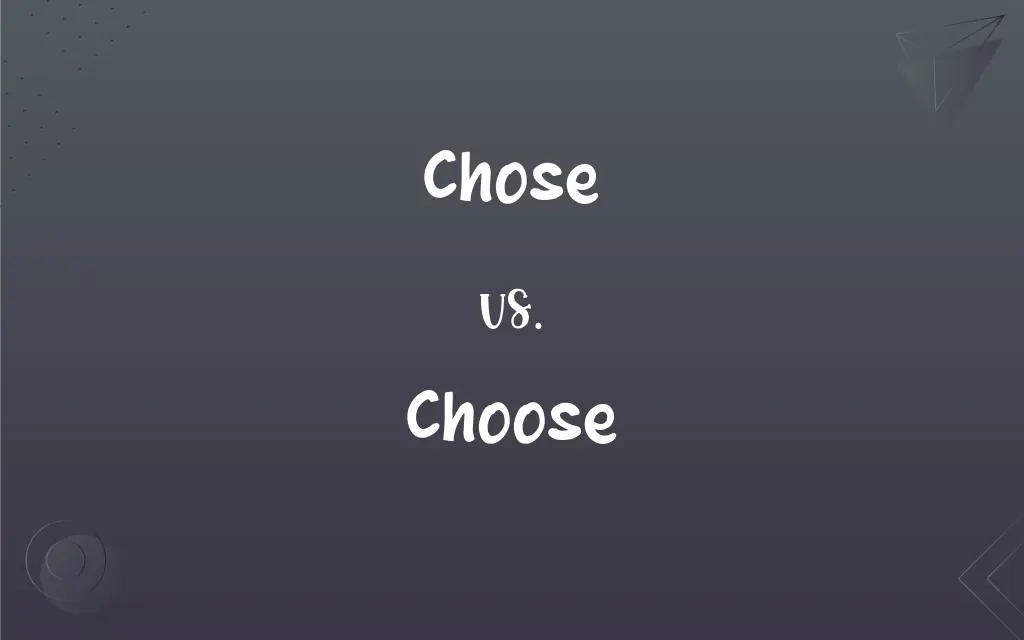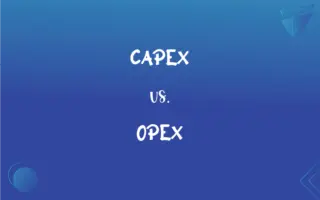Chose vs. Choose: What's the Difference?
Edited by Aimie Carlson || By Harlon Moss || Updated on October 18, 2023
"Chose" is the past tense of "choose," which means to select from multiple options.

Key Differences
"Chose" and "choose" are both verbs related to the act of selection. However, they differ significantly in terms of their tense. "Chose" is the simple past tense form of the verb, indicating that the action of selecting or deciding on something has already been completed. For instance, "She chose the red dress for the party," implies that the selection was made in the past.
"Choose," on the other hand, is the present tense form of the verb. It indicates an action that is currently happening or a general truth. When someone says, "I choose to stay positive," it suggests an ongoing present decision. Similarly, "You can choose any item from the menu," means the person has the current option to decide on a particular dish.
The distinction between "chose" and "choose" is crucial for maintaining clarity and accuracy in English communication. Their misuse can lead to misunderstandings or, at the very least, grammatical errors. For instance, saying "I choose the chocolate cake yesterday" would be incorrect; the proper statement would be "I chose the chocolate cake yesterday."
Furthermore, the future tense of "choose" is "will choose." For example, "Tomorrow, I will choose the venue for the meeting." Understanding the difference between "chose" and "choose" is essential for mastering tenses in the English language, ensuring that statements and narratives remain clear and chronologically accurate.
Comparison Chart
Tense
Past
Present
ADVERTISEMENT
Example
He chose the blue shirt.
He will choose the blue shirt today.
Usage
Indicates a completed action.
Indicates an ongoing or general action.
Infinitive Form
To choose
To choose
Association with Time
Refers to a past event
Refers to a current or general event
Chose and Choose Definitions
Chose
A selection finalized previously.
Out of all the gifts, he chose the book.
ADVERTISEMENT
Choose
To pick out or select from multiple options.
We can choose to go by bus or train.
Chose
A determination made in a prior instance.
She chose to invest in stocks last year.
Choose
To make a decision or determination.
She must choose between two job offers.
Chose
The act of picking a particular option in the past.
They chose the first option on the list yesterday.
Choose
To elect or decide on preference.
Students can choose their elective subjects.
Chose
Past tense of the verb "choose," indicating a completed selection.
She chose the best candidate for the job.
Choose
A verb indicating the act of selecting or making a decision.
You can choose your favorite color.
Chose
Indicates a decision made in the past.
They chose to travel by train last summer.
Choose
To decide on a course of action.
I choose to remain silent on this issue.
Chose
Past tense of choose.
Choose
To select from a number of possible alternatives; decide on and pick out
Which book did you choose at the library?.
Chose
An item of personal property; a chattel.
Choose
To prefer above others
Chooses the supermarket over the neighborhood grocery store.
Chose
Past participle of choose
Chose
(legal) A thing; personal property.
Chose
A thing; personal property.
FAQs
Can "chose" be used for future events?
No, "chose" indicates past actions.
How can I use "choose" in a sentence?
For instance: "You can choose any dessert from the menu."
Can you give an example of "chose" in a sentence?
"He chose to attend the morning session."
What is the future tense of "choose"?
The future tense is "will choose."
What tense should I use for actions happening now, chose or choose?
You should use "choose" for present actions.
Is it correct to say "I choose to go there yesterday"?
No, it should be "I chose to go there yesterday."
What does "choose" mean?
"Choose" means to select from multiple options or decide on a course of action.
Is "chose" the infinitive form of the verb?
No, the infinitive form is "to choose."
Is "chose" a verb?
Yes, "chose" is the past tense form of the verb "choose."
What is the main difference between chose and choose?
"Chose" is the past tense of the verb "choose."
What's the opposite of choose?
The opposite could be "reject" or "discard."
Can I say "I chose to stay positive every day"?
It would be better to say, "I choose to stay positive every day."
How can I use "choose" in the future tense?
You can say, "I will choose the best option tomorrow."
What is the past participle of "choose"?
The past participle is "chosen."
Can I replace "choose" with "pick"?
In many contexts, "choose" and "pick" can be used interchangeably, but nuances might differ.
Is "choose" related to present actions?
Yes, "choose" is the present tense form of the verb.
Which word indicates a completed action, chose or choose?
"Chose" indicates a completed action.
Can "choose" indicate a general truth?
Yes, such as in "We can choose to be kind."
How do I use "chose" correctly?
Use "chose" when referring to past selections or decisions.
Which word indicates a selection yet to be made, chose or choose?
"Choose" indicates a selection yet to be made.
About Author
Written by
Harlon MossHarlon is a seasoned quality moderator and accomplished content writer for Difference Wiki. An alumnus of the prestigious University of California, he earned his degree in Computer Science. Leveraging his academic background, Harlon brings a meticulous and informed perspective to his work, ensuring content accuracy and excellence.
Edited by
Aimie CarlsonAimie Carlson, holding a master's degree in English literature, is a fervent English language enthusiast. She lends her writing talents to Difference Wiki, a prominent website that specializes in comparisons, offering readers insightful analyses that both captivate and inform.































































